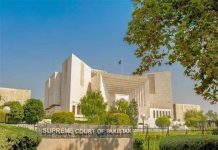By Abid Usman
ISLAMABAD: The honourable top judge was categorical when he remarked last Wednesday that the country’s court houses would not be shut, no matter what. He made the pronouncement as the apex court was hearing a case concerning PIA. His statement was apparently a response to the executive branch’s perceived exhortation to stop court proceedings in view of exponential rise in coronavirus cases across the country. At the time, Chief Justice of Pakistan Justice Gulzar Ahmed was livid at the government’s mind-boggling failure to quell the threat of Covid-19 with adequate measures. He expressly noted, ‘œWe have been requested to halt judicial proceedings but the court will not be shut down.’ True to that resolve, a National Judicial Policy Making Committee (NJPMC) meeting on Thursday decided that the courts will continue to function. The CJP, who chaired the meeting, expressed the belief that the process of dispensation of justice should not stop at any time. He also said all high courts can take their own decisions. But at the same time, the meeting decided that courts will follow all SOPs.
There is not a shred of doubt that large-scale disruptions to the wok of judges and lawyers could have far-reaching impact on litigants. If the court functions come to a grinding halt, it would affect not only those with extremely pressing matters, such as incarcerated people in jail awaiting a trial or those in need of a protective order, but also individuals seeking out the courts for important matters affecting their businesses or families. But, with due respect to our justices, the other reality in the form of a real threat posed by coronavirus, must not be glossed over. We appreciate the fact that our judiciary is ever so ready to serve the litigants even in dire situations such as this. We stay assured that our judges must have weighed the pros and cons of continuing to work and taken necessary precautions to ensure the risk of contagion hitting courtrooms is effectively quelled.




